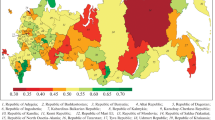Abstract—
In article the issues of resilience of regions to crisis shocks and methods of their assessment are considered. Indicators of GRP dynamics during the crisis period were used as a resilience criterion. A grouping of regions depending on the response to the economic crisis is presented, regions resistant to the crises of 2009 and 2015 are identified. To assess the contribution to the regional dynamics of the consequences of national, structural and regional shocks, the method of structural shifts was used. It is shown that the regional component is a significant factor determining the resilience of the region. The contribution of regional factors to resilience was quantified on the basis of regression analysis.


Similar content being viewed by others
Notes
Hereinafter, the crisis is named in accordance with the year in which the minimum values of the indicators characterizing the crisis were noted for the crisis period. Despite the fact that the decline in production in some regions began in 2008, 2009 is cited as a crisis year, when national indicators became negative. Similarly, during the 2014–2015 crisis, the decline in production occurred only in 2015, which is used to indicate the crisis.
The essence of the method consists in decomposing the incremental regional indicator into three components: ∆ = NS + MS + RS, national component (NS), industry structure component (MS), and regional component (RS). The peculiarities of using the method of structural shifts for assessing the contribution of national and regional factors to economic growth, see [5, 6].
A synthetic typology of regions was proposed in [12].
REFERENCES
E. Hill, T. St. Clair, H. Wial, H. Wolman, P. Atkins, P. Blumenthal, S. Ficenec, and A. Friedhoff, Economic Shocks and Regional Economic Resilience Working Paper 2011-03 (Inst. Gov. Stud., Univ. Calif., 2012). https:// www.researchgate.net/publication/285940047_Economic_ shocks_and_regional_economic_resilience.
R. Pendall, K. A. Foster, and M. Cowell, “Resilience and regions: Building understanding of the metaphor,” Cambridge J. Reg. Econ. Soc. 3 (1), 71–84 (2010).
I. V. Danilova, O. A. Bogdanova, and A. Zh. Telyubaeva, “Effect of external institutional shocks on the differentiation of the economic space of the Russian Federation,” Vestn. Yuzhno-Ural. Gos. Univ., Ser. Ekon. Menedzh. 13 (3), 23–32 (2019).
N. N. Mikheeva, “Economic dynamics of Russian regions: Crises and ways to restore growth,” Reg. Res. Russ. 10, 1–9 (2020).
J. Esteban, “Regional convergence in Europe and the industry mix: A shift-share analysis,” Reg. Sci. Urban Econ. 30, (3), 353–364 (2000).
N. N. Mikheeva, “Macroeconomic effects of structural shifts in economy of regions,” Reg.: Ekon. Sotsiol., No. 4, 42–68 (2018).
World Development Report 2009: Reshaping Economic Geography (World Bank, 2009).
S. P. Zemtsov and Yu. A. Smelov, “Factors of regional development in Russia: Geography, human capital, or regional politics,” Zh. Nov. Ekon. Assots., No. 4, 84–108 (2018).
P. Di Caro and U. Fratesi, “Regional determinants of economic resilience,” Ann. Reg. Sci. 60, 235–240 (2018).
S. Brakman, H. Garretsen, and C. Van Marrewijk, “Regional resilience across Europe: On urbanisation and the initial impact of the Great Recession,” Cambridge J. Reg. Econ. Soc. 8 (2), 225–240 (2015).
E. Giannakis and A. Bruggeman, “Determinants of regional resilience to economic crisis: A European perspective,” Eur. Plann. Stud. 25 (8), 1394–1415 (2017).
Russian Regions: Economic Crisis and Problems of Modernization, Ed. by L. M. Grigor’ev, N. V. Zubarevich, and G. R. Khasaev (TEIS, Moscow, 2011) [in Russian].
Author information
Authors and Affiliations
Corresponding author
Ethics declarations
The authors declare that they have no conflicts of interest.
Rights and permissions
About this article
Cite this article
Mikheeva, N.N. Resilience of Russian Regions to Economic Shocks. Stud. Russ. Econ. Dev. 32, 68–77 (2021). https://doi.org/10.1134/S107570072101010X
Received:
Revised:
Accepted:
Published:
Issue Date:
DOI: https://doi.org/10.1134/S107570072101010X




